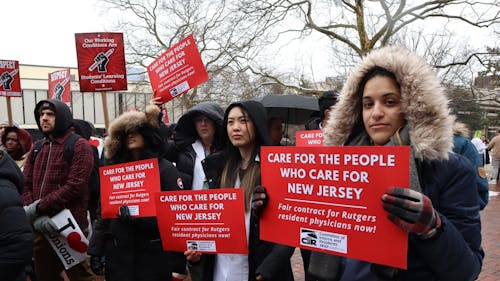EDITORIAL: How would potential AAUP-AFT strike affect students?
Rutgers is putting faculty members and students in an unfair position

As announced on Tuesday, the Rutgers American Association of University Professors and American Federation of Teachers (AAUP-AFT) has opened a vote on whether Rutgers' faculty will authorize a strike in order to negotiate their contracts with the administration.
This vote would give union leaders the authority to call a strike if they believe negotiations are not successful. Non-union members could also join the picket line to support the cause. A 2023 Strike FAQ document released by the Rutgers AAUP-AFT answers some other questions about what the strike would consist of.
This idea of a potential strike has stirred many concerns among the student body. For example, on Saturday, there was a technological malfunction that caused students to be temporarily unenrolled from their courses on Canvas.
While a University-wide email explained that this error was due to technical difficulties and unrelated to union activity, social media threads contemplated if Canvas classes disappearing had anything to do with a potential strike from Rutgers staff.
An Instagram post from the Rutgers AAUP-AFT said, "We definitely did not cause Canvas to go down." In addition to this, the organization released a statement that said, "We would never risk harming our students like this. And, we would never start any kind of work stoppage action without announcing it to students first."
While these sentiments attempt to quell student anxieties over a possible strike, it is still reasonable to consider how a strike would affect students on campus.
In a study from the International Journal of Educational Development, it was found that on average, students who had experienced more labor strikes during their academic career scored lower on math and reading examinations.
Regardless of well-placed intentions, strikes inevitably have a negative impact on academic performance. This should be a major concern for Rutgers as supporting its student's education should be its main priority.
Depending on the length of a strike, students could miss multiple days or weeks of instruction, meaning significant content could be cut from the curriculum. Diminished lesson plans and altered timelines could have a dangerous ripple effect.
If students are in introductory-level classes and need to retain the content for upper-level classes, they will not have the foundation to effectively do so if their curriculum is cut.
This could put students in an alarming state of anxiety. Will teachers be able to respond to emails? When will they be able to grade essays and exams? What does this mean for clubs or organizations that they may run? How long will all this last?
As young people continue to grapple with these academic concerns and inevitable burnout, adding a strike to the mix could likely exacerbate these issues.
When 48,000 graduate student academic workers from the University of California went on strike starting in November 2022, undergraduate students had to choose between attending classes as per usual or joining the cause.
Ultimately, Rutgers should never have allowed things to get to this point. The University is putting both educators and students in a difficult position. Faculty deserve fair pay for all the work that they do, especially adjunct professors and graduate students who act as teaching and graduate assistants. They not only teach multiple classes but also participate in research, which contributes strongly to Rutgers as an institution.
Rutgers needs to prioritize education. The purpose of higher education is to encourage a deeper level of learning, and the University is potentially jeopardizing this by not providing adequate pay for the people who facilitate this learning.
While residence halls and buildings seemingly fall apart and professors plead for a fair contract, Rutgers continues to funnel money into an athletic department that has accumulated more than $250 million in debt.
Some may say that Rutgers Athletics' value is demonstrated in the more than $100 million in revenue it has brought in in recent years, but these individuals fail to recognize the long-term detriments that may occur if education is shortchanged for athletics.
Most college athletes, including those at Rutgers, will not compete professionally. For example, only 1.6 percent of college football players will eventually play in the NFL.
While every Rutgers fan can appreciate a Big Ten game under the lights, it is a fact that most college athletes will need to use their degree, just like every other student at Rutgers. We cannot lose sight of this — academics must come first.
Educator strikes inevitably hurt students and put both teachers and students in an ethical dilemma that Rutgers should have avoided at all costs. While we consider the possible impact on the student body, we must hope that Rutgers' administration and the union make it to the negotiations table soon enough.
Editor's Note: This article has been updated to clarify information.
The Daily Targum's editorials represent the views of the majority of the 155th editorial board. Columns, cartoons and letters do not necessarily reflect the views of the Targum Publishing Company or its staff.



